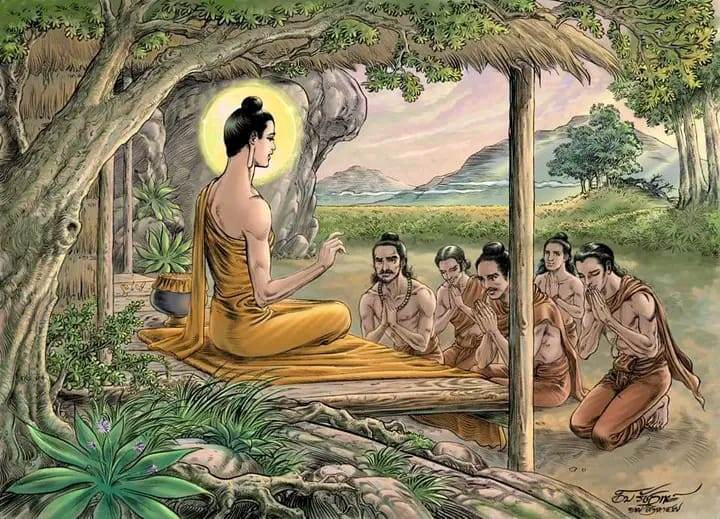? निब्बानसुख सुतं ?
?Nibbāna ?एक समय आयुष्मान सारिपुत्र राजगृह के वेळुवन में कलन्दक-निवप में विहार करते थे। वहाँ आयुष्मान सारिपुत्र ने भिक्षुओं को सम्बोधित किया—“आयुष्मानो ! निर्वाण सुख है। आयुष्मानो ! निर्वाण सुख है।” ऐसा कहने पर आयुष्मान उदायी ने आयुष्मान सारिपुत्र को यह कहा-“आयुष्मान सारिपुत्र ! यह कैसा ‘सुख’ है, जो किसी प्रकार की सुख, दुख अथवा असुख-अदुख वेदना नहीं है ? ‘
Thus have I heard. On one occasion the Venerable Säriputta was dwelling at Rājagaha in the Bamboo Grove, the squirrel sanctuary. There the Venerable Sāriputta addressed the bhikkhus: “Friends, bhikkhus!”
“Friend!” those bhikkhus replied. The Venerable Sāriputta said this: “Happiness, friends, is this Nibbana. Happiness, friends, is this nibbāna.”
When this was said, the Venerable UdãyĪ said to the Venerable Sāriputta:) “But, friend Sāriputta, what happiness could there be here when nothing is felt here?”
“आयुष्मानो ! यही सुख’ है कि इसमें सुख, दुख, असुख-अदुख किसी प्रकार की ‘वेदना’ नहीं है। आयुष्मानो ! ये पाँच काम-गुण (कामनाये) है। कौन से पाँच ?
चक्षु के अनुभव में आनेवाले रूप, इष्ट, मनोरम, अच्छे लगने वाले, प्रियकर कामना-युक्त तथा मनोरंजक ; श्रोत्र के अनुभव में आने वाले शब्द, इष्ट. . . . मनोरंजक ; घाण के अनुभव में आने वाले गन्ध, इष्ट. . . . मनोरंजक ; जिह्वा के अनुभव आनेवाले रस, इष्ट… मनोरंजक ; काय (शरीर) के अनुभव में आने वाले स्पृष्टव्य, इष्ट….. मनोरंजक –आयुष्मानो ! ये पाँच काम-गुण हैं। भिक्षुओ, इन पाँच काम-गुणों के कारण जो ‘सुख’, जो ‘आनंद उत्पन्न होता है, यही ‘काम-सुख’ कहलाता है।
“Just this, friend, is the happiness here, that nothing is felt here.
“There are friends, these five objects of sensual pleasure. What five? Forms cognizable by the eye that are wished for, desired, agreeable, pleasing, connected with sensual pleasure, tantalizing; sounds cognizable by the ear… odors cognizable by the nose… tastes cognizable by the tongue… tactile objects cognizable by the body that are wished for, desired, agreeable, pleasing, connected with sensual pleasure, tantalizing. These are the five objects of sensual pleasure. Any pleasure or joy that arises in dependence on these five objects of sensual pleasure is called sensual pleasure.
आयुष्मानो ! एक भिक्षु काम-भोगों से पृथक हो …. प्रथम-ध्यान को प्राप्त हो विहार करता है। आयुष्मानो ! यदि इस चित्तावस्था में रहते हुए उसके मन में काम-वासना के भाव उत्पन्न होते हैं , ये उसके लिये विघ्न होते हैं। आयुष्मानो ! जैसे किसी भी सुखी आदमी को जो दुख उत्पन्न होता है, वह विघ्नकर होता है। इसी प्रकार उसके मन में काम-वासना के भाव उत्पन्न होते हैं। ये उसके लिये विघ्न होते हैं। आयुष्मानो ! जितने भी विघ्न है, जितनी भी बाधायें हैं, उन्हें भगवान्ने दुख कहा है। इस तरह भी आयुष्मानो ! यह जानना चाहिये कि निर्वाण ‘सुख’ है।
(1) “Here, friends, secluded from sensual pleasures, secluded from unwholesome states, a bhikkhu enters and dwells in the first jhāna, which consists of rapture and pleasure born of seclusion, accompanied by thought and examination. If, while that bhikkhu is dwelling in this way, perception and attention accompanied by sensuality occur in him, he feels it as an affliction. Just as pain might arise for one feeling pleasure only to afflict him, so too if that perception and attention accompanied by sensuality, occur in him, he feels it as an affliction. But the Blessed One has called affliction suffering. In this way it can be understood how nibbāna is happiness,
फिर आयुष्मानो ! एक भिक्षु वितर्क-विचारों का उपशमन कर ….द्वितीय ध्यान को प्राप्त कर विहार करता है। आयुष्मान ! यदि इस चित्तावस्था में रहते हुए उसके मन में तर्क-वितर्क के भाव उत्पन्न होते हैं, ये उसके लिये विघ्न होते हैं। आयुष्मानी ! जैसे किसी भी सुखी आदमी को जो दुख उत्पन्न होता है, वह विघ्नकर होता है। इसी प्रकार उसके मन में तर्क-वितर्क उत्पन्न होते हैं। ये उसके लिये विघ्न होते हैं। आयुष्मानो ! जितने भी विघ्न है, जितनी भी बाधाये हैं, उन्हें भगवानने दुख कहा है। इस तरह भी आयुष्मानो ! यह जानना चाहिये कि ‘निर्वाण’ ‘सुख’ है।
(2) “Again, with the subsiding of thought and examination, a bhikkhu enters and dwells in the second jhāna…. If, while. that bhikkhu is dwelling in this way, perception and attention accompanied by thought occur in him, he feels it as an affliction. Just as pain might arise for one feeling pleasure only to afflict him, so too if that perception and attention accompanied by thought occur in him, he feels it as an affliction. But the Blessed One has called affliction suffering. In this way, too, it can be understood how nibbāna is happiness.
फिर आयुष्मानो ! एक भिक्षु ‘प्रीति’ का उपशमन कर …. तृतीय ध्यानको प्राप्त कर विहार करता है। आयुष्मानो यदि इस चित्तावस्था में रहते हुए उसके मन में ‘प्रीति’ के भाव उत्पन्न होते हैं, ये उसके लिए विघ्न’ होते हैं।आयुष्मानो ! जैसे किसी भी सुखी आदमीको जो दुख उत्पन्न होता है, वह विघ्नकर होता है। इसी प्रकार उसके मनमें ‘प्रीति’ के भाव उत्पन्न होते हैं। ये उसके लिए विघ्न होते हैं। आयुष्मानो ! जितने भी विघ्न हैं, जितनी भी बाधायें हैं, उन्हें भगवानने दुख कहा है। इस तरह भी आयुष्मानो ! यह जानना चाहिये कि निर्वाण ‘सुख है।
(3) “Again, with the fading away as well of rapture….he enters and dwells in the third jhāna. … If, while that bhikkhu is dwelling in this way, perception and attention accompanied by rapture occur in him, he feels it as an affliction. … In this way, too, it can be understood how nibbāna is happiness.
फिर आयुष्मानो ! भिक्षु ‘सुख’ का प्रहाण कर …… चतुर्थ-ध्यान को प्राप्त कर विहार करता है। आयुष्मानो यदि इस चित्तावस्था में रहते हुए ‘उपेक्षा के भाव उत्पन्न होते हैं, ये उसके लिये ‘विघ्न’ होते हैं।
आयुष्मानो ! जैसे किसी भी सुखी आदमी को जो ‘दुख’ उत्पन्न होता है, वह विघ्नकर होता है। इसी प्रकार उसके मन में ‘उपेक्षा के भाव उत्पन्न होते हैं। ये उसके लिये विघ्न होते हैं। आयुष्मानो ! जितने भी विघ्न हैं, जितनी भी बाधायें हैं, उन्हें भगवानने दुःख कहा है। इस तरह भी आयुष्मानो ! यह जानना चाहिए कि निर्वाण ‘सुख’ है।
(4) “Again, with the abandoning of pleasure and pain …a bhikkhu enters and dwells in the fourth jhāna. … If, while that bhikkhu is dwelling in this way, perception and attention accompanied by the pleasure (connected with] equanimity occur in him, he feels it as an affliction…. In this way, too, it can be understood how nibbāna is happiness.
फिर आयुष्मानो ! भिक्षु सभी ‘रूप’ संज्ञाओं का प्रहाण कर, प्रतिघ-संज्ञाओं के अस्त हो जाने पर, नानात्व संज्ञाओं की ओर से उपेक्षावान हो ‘आकाश अनन्त है करके आकाशानञ्चायतन को प्राप्त कर विहार करता है। आयुष्मानो ! यदि इस चित्तावस्था में रहते हुए ‘रूप के भाव उत्पन्न होते हैं, तो ये उसके लिये विघ्न’ होते हैं। आयुष्मानो ! जैसे किसी भी सुखी आदमी को जो ‘दुख’ उत्पन्न होता है। वह विघ्नकर होता है। इसी प्रकार उसके मन में ‘रूप’ के भाव उत्पन्न होते हैं। ये उसके लिए ‘विघ्न’ होते हैं। आयुष्मानो ! जितने भी विघ्न हैं, जितनी भी बाधाये हैं, उन्हें भगवान ने दुख कहा है। इस तरह भी आयुष्मानो ! यह जानना चाहिए। कि निर्वाण ‘सुख’ है।
(5) “Again, with the complete surmounting of perceptions of forms, with the passing away of perceptions of sensory impingement, with non-attention to perceptions of diversity, (perceivingl ‘space is infinite,’ a bhikkhu enters and dwells in the base of the infinity of space. If, while that bhikkhu is dwelling in this way, perception and attention accompanied by forms occur in him, he feels it as an affliction….. In this way, too, it can be understood how nibbāna is happiness.
फिर आयुष्मानो ! भिक्षु पूरी तरहसे ‘आकाशानञ्चायतन का समतिक्रमण कर विज्ञान अनन्त है’ करके विज्ञानञ्चायतन’ को प्राप्त कर विहार करता है। आयुष्मानो ! यदि इस चित्तावस्था में रहते हुए ‘आकाशानंचायतन’ के भाव उत्पन्न होते हैं, तो ये उसके लिये ‘विघ्न’ होते हैं। आयुष्मानो ! जैसे किसी भी सुखी आदमी को जो ‘दुख’ उत्पन्न होता है, वह विघ्नकर होता है। इसी प्रकार उसके मनमें ‘आकाशानञ्चायतन’ के भाव उत्पन्न होते हैं। ये उसके लिये विघ्न’ होते हैं। आयुष्मानो ! जितने भी ‘विघ्न’ है, जितनी भी बाधायें हैं। उन्हें भगवान्ने ‘दुख’ कहा है। इस तरह भी आयुष्मानो ! यह जानना चाहिये कि निर्वाण ‘सुख’ है।
(6) “Again, by completely surmounting the base of the infinity of space, (perceiving] ‘consciousness is infinite,’ a bhikkhu enters and dwells in the base of the infinity of consciousness. If, while that bhikkhu is dwelling in this way, perception and attention accompanied by the base of the infinity of space occur in him, he feels it as an affliction…. In this way, too, it can be understood how nibbāna is happiness..
फिर आयुष्मानो ! भिक्षु पूरी तरहसे ‘विज्ञानञ्चायतन’ का समतिक्रमण कर ‘कुछ नहीं है करके ‘आकिञ्चन्यायतन’ को प्राप्त हो विहार करता है। आयुष्मानो ! यदि इस चित्तावस्था में रहते हुए विज्ञानञ्चायतन’ के भाव उत्पन्न होते हैं, तो ये उसके लिए ‘विघ्न’ होते हैं। आयुष्मानो ! जैसे किसी भी सुखी आदमी को जो दुख उत्पन्न होता है, वह विघ्नकर होता है। इसी प्रकार उसके मनमें ‘विज्ञानञ्चायतन’ के भाव उत्पन्न होते हैं। ये उसके लिये ‘विघ्न’ होते हैं। आयुष्मानो ! जितने भी विघ्न हैं, जितनी भी बाधायें हैं, भगवान्ने उन्हें दुख कहा है। इस तरह भी आयुष्मानो ! यह जानना चाहिए कि निर्वाण ‘सुख’ है।
(7).”Again, by completely surmounting the base of the infinity of consciousness, (perceiving there is nothing, a bhikkhu enters and dwells in the base of nothingness. If, while that bhikkhu is dwelling in this way, perception and attention accompanied by the base of the infinity of consciousness occur in him, he feels it as an affliction…. In this way, too, it can be understood how nibbāna is happiness. .
फिर आयुष्मानो ! भिक्षु पूरी तरहसे ‘आकिञ्चन्यायतन’का समतिक्रमण कर ‘नेवसंज्ञानासंज्ञायतन’ को प्राप्त कर विहार करता है। आयुष्मानो ! यदि इस चित्तावस्थामें रहते हुए ‘आकिञ्चन्यायतन’ के भाव उत्पन्न होते हैं, तो ये उसके लिए विघ्न’ होते हैं। आयुष्मानो ! जैसे किसी भी सुखी आदमीको जो दुख उत्पन्न होता है, वह विघ्नकर होता है। इसी प्रकार उसके मन में ‘आकिञ्चन्यायतन’ के भाव उत्पन्न होते हैं। ये उसके लिए ‘विघ्न’ होते हैं। आयुष्मानो ! जितने भी विघ्न हैं, जितनी भी बाधायें हैं, भगवान्ने उन्हें ‘ दुख ‘ कहा है। इस तरह भी आयुष्मानो ! यह जानना चाहिए कि निर्वाण सुख है।
(8) “Again, by completely surmounting the base of nothingness, a bhikkhu enters and dwells in the base of neither perception nor non-perception. If, while that bhikkhu is dwelling in this way, perception and attention accompanied by the base of nothingness occur in him, he feels it as an affliction. Just as pain might arise for one feeling pleasure only to afflict him, so too if that perception and attention accompanied by the base of nothingness occur in him, he feels it as an affliction. But the Blessed One has called affliction suffering. In this way, too, it can be understood how nibbāna is happiness.
फिर आयुष्मानो! भिक्षु पूरी तरह से ‘नवसंज्ञानासंज्ञायतन’ का समतिक्रमण कर संज्ञा-वेदना के निरोध को प्राप्त हो विहार करता है। प्रज्ञा द्वारा इष्ट होने के कारण उसके आस्रव क्षीण हो जाते हैं। इस तरह भी आयुष्मानो ! यह जानना चाहिए कि निर्वाण सुख है।
(9) “Again, by completely surmounting the base of neither perception nor non perception, a bhikkhu enters and dwells in the cessation of perception and feeling, and having seen with wisdom, his taints are utterly destroyed. In this way, too, it can be understood how nibbāna is happiness.”
अन्गुतरनिकाय नवम-निपात
AngutterNikaya 9.34(3)
???
???







